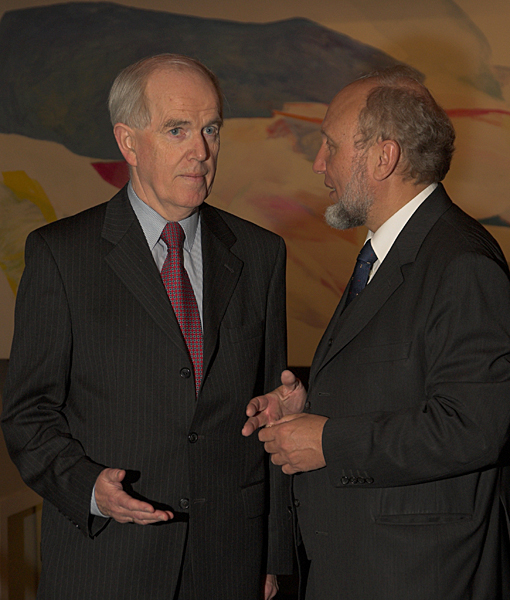"The Worst is Yet to Come"
Europe has not yet felt the full power of the financial crisis and the USA will need a decade to rebuild its economy. These were among the conclusions given by Professor Hans-Werner Sinn during The Sandmo Lecture.
22.01.2009 - Hallvard Lyssand, translated by Jessica Hartenberger
Hans-Werner Sinn is professor of economics at Ludwig Maximilian University in München, and is recognized as one of the leading economists in Europe. He recently visited NHH to give The Sandmo Lecture on Public Policy, which is an annual guest lecture in honour of Professor Agnar Sandmo.
The American Bubble
Professor Sinn's lecture was entitled The Financial Crisis, and touched upon the causes for the situation that has occurred within the world economy and the possible solutions for reducing the effects of the crisis in both the short and long term.
Sinn focused primarily on different parts of the American economy from government financing and investment banking to private borrowers in the housing market. He showed how several factors - from gigantic export deficits, reduced government regulations, lack of household savings, bad mortgages and poor loan financing to excessive risk and complicated financial structures involving the transfer of debt - have contributed, over time, to the growth of an economic bubble.
Casino Capitalism
As known, when the bubble popped, the downturn was extreme. The dollar plunged, housing prices and sales plummeted, unemployment rates increased; and after a while banks around the world also went under, to a level which professor Sinn called frightening.
He ascertained that both Wall Street and "Main Street" have taken way too many risks, and that parts of the American system have contributed to the growth of the problem. For example, investment banks were operating with very low equity-capital while taking sky high risks. As long as profits were made, money was distributed to shareholders in the form of dividends, not used to build up the bank's equity. As a result, banks became vulnerable.
Sinn labelled this practice Casino Capitalism, and stated that the real problems start when losses occur but nobody has the responsibility or capacity to cover them.
The professor also criticised the credit rating agencies. He pointed out that the investment bank, Lehman Brothers, received an A+ rating the day before it went bankrupt. He stated problems like these were caused because rating agencies avoided downgrading their most lucrative clients. Sinn stressed that credit rating should become a public undertaking.
No Risks
He emphasized that limited liability is also a problem in the private housing market. In many American states, home buyers can easily walk away from both their house and their loan obligations when market values drop.
"The risk is not theirs. They can borrow the whole value of the house, but lose nothing when prices fall. They just return the key and let the bank sort out the problem," said Sinn.
Consequently, home buyers with poor credit were taking out large home loans.
That banks even lend out money to customers with poor credit is partially connected to political demand of giving home loans to disadvantaged groups of people.
"In reality, borrowers who were turned down by banks could go to court to obtain a loan," Sinn pointed out, adding that president Barack Obama during his work as an attorney helped clients with such cases.
Financial institutions also contributed to the worsening of the problems by re-selling loans to other banks, and often in very complicated ways.
Opium and more Opium
"The Americans took opium for ten years. Now they have severe headaches," said Sinn, but added that ironically the short-term cure is to take more opium, thus pumping more money into a bad system.
He stressed that the American economic model has fallen apart, that Americans have a difficult decade in front of them, and that long term solutions include reduced consumption and increased exports.
Delayed effect
Hans-Werner Sinn was not very optimistic on behalf of the rest of the world. According to Sinn there is reason to assume the worst is yet to come for Europe, and that the crisis will finally peak in about a year.
"Gigantic rescue packages in several countries prevented a total collapse in the banking sector, but we are in a global recession, and there are still many dangers ahead for the world economy," said Sinn.
Part of the solution that Sinn suggests involves international collaboration on bank regulations, for instance establishing stricter requirements concerning the minimum amount of equity-capital to prevent excessive risk. Sinn stressed that German banks should be required to take public funding from rescue packages, as has been done in England.
Deep Insight
Professor Agnar Sandmo thought that Sinn showed deep insight in the processes which he described, and that the lecture contained a great deal of original analysis, especially in relation to incentives in the financial institutions.
"He definitely showed the seriousness of the situation, and that the real recession has not yet hit us," said Sandmo.

Professors Agnar Sandmo and Hans-Werner Sinn.
Foto: Kristian T. Marthinsen
|

